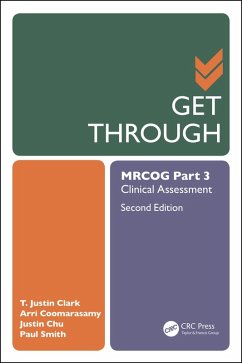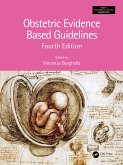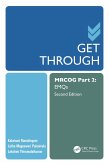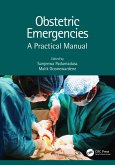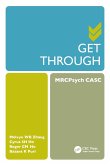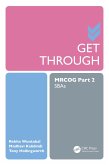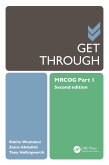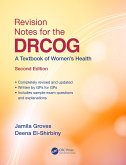T. Justin Clark, Arri Coomarasamy, Justin Chu, Paul Smith
Get Through MRCOG Part 3 (eBook, PDF)
Clinical Assessment, Second Edition
37,95 €
37,95 €
inkl. MwSt.
Sofort per Download lieferbar

19 °P sammeln
37,95 €
Als Download kaufen

37,95 €
inkl. MwSt.
Sofort per Download lieferbar

19 °P sammeln
Jetzt verschenken
Alle Infos zum eBook verschenken
37,95 €
inkl. MwSt.
Sofort per Download lieferbar
Alle Infos zum eBook verschenken

19 °P sammeln
T. Justin Clark, Arri Coomarasamy, Justin Chu, Paul Smith
Get Through MRCOG Part 3 (eBook, PDF)
Clinical Assessment, Second Edition
- Format: PDF
- Merkliste
- Auf die Merkliste
- Bewerten Bewerten
- Teilen
- Produkt teilen
- Produkterinnerung
- Produkterinnerung

Bitte loggen Sie sich zunächst in Ihr Kundenkonto ein oder registrieren Sie sich bei
bücher.de, um das eBook-Abo tolino select nutzen zu können.
Hier können Sie sich einloggen
Hier können Sie sich einloggen
Sie sind bereits eingeloggt. Klicken Sie auf 2. tolino select Abo, um fortzufahren.

Bitte loggen Sie sich zunächst in Ihr Kundenkonto ein oder registrieren Sie sich bei bücher.de, um das eBook-Abo tolino select nutzen zu können.
This study guide offers a systematic, comprehensive and focused approach to preparation for the MRCOG Part 3 Clinical Assessment exam, offering an analysis of what each station is testing and what approaches and preparation are required, supported by tips and examples.
- Geräte: PC
- mit Kopierschutz
- eBook Hilfe
- Größe: 3.67MB
Andere Kunden interessierten sich auch für
![Obstetric Evidence Based Guidelines (eBook, PDF) Obstetric Evidence Based Guidelines (eBook, PDF)]() Obstetric Evidence Based Guidelines (eBook, PDF)119,95 €
Obstetric Evidence Based Guidelines (eBook, PDF)119,95 €![Get Through MRCOG Part 2 (eBook, PDF) Get Through MRCOG Part 2 (eBook, PDF)]() Kalaivani RamalingamGet Through MRCOG Part 2 (eBook, PDF)37,95 €
Kalaivani RamalingamGet Through MRCOG Part 2 (eBook, PDF)37,95 €![Obstetric Emergencies (eBook, PDF) Obstetric Emergencies (eBook, PDF)]() Obstetric Emergencies (eBook, PDF)103,95 €
Obstetric Emergencies (eBook, PDF)103,95 €![Get Through MRCPsych CASC (eBook, PDF) Get Through MRCPsych CASC (eBook, PDF)]() Melvyn Zhang WeibinGet Through MRCPsych CASC (eBook, PDF)44,95 €
Melvyn Zhang WeibinGet Through MRCPsych CASC (eBook, PDF)44,95 €![Get Through MRCOG Part 2 (eBook, PDF) Get Through MRCOG Part 2 (eBook, PDF)]() Rekha WuntakalGet Through MRCOG Part 2 (eBook, PDF)33,95 €
Rekha WuntakalGet Through MRCOG Part 2 (eBook, PDF)33,95 €![Get Through MRCOG Part 1 (eBook, PDF) Get Through MRCOG Part 1 (eBook, PDF)]() Rekha WuntakalGet Through MRCOG Part 1 (eBook, PDF)33,95 €
Rekha WuntakalGet Through MRCOG Part 1 (eBook, PDF)33,95 €![Revision Notes for the DRCOG (eBook, PDF) Revision Notes for the DRCOG (eBook, PDF)]() Jamila GrovesRevision Notes for the DRCOG (eBook, PDF)58,95 €
Jamila GrovesRevision Notes for the DRCOG (eBook, PDF)58,95 €-
-
-
This study guide offers a systematic, comprehensive and focused approach to preparation for the MRCOG Part 3 Clinical Assessment exam, offering an analysis of what each station is testing and what approaches and preparation are required, supported by tips and examples.
Dieser Download kann aus rechtlichen Gründen nur mit Rechnungsadresse in A, B, BG, CY, CZ, D, DK, EW, E, FIN, F, GR, HR, H, IRL, I, LT, L, LR, M, NL, PL, P, R, S, SLO, SK ausgeliefert werden.
Produktdetails
- Produktdetails
- Verlag: Taylor & Francis
- Seitenzahl: 272
- Erscheinungstermin: 3. September 2018
- Englisch
- ISBN-13: 9781351016223
- Artikelnr.: 54254314
- Verlag: Taylor & Francis
- Seitenzahl: 272
- Erscheinungstermin: 3. September 2018
- Englisch
- ISBN-13: 9781351016223
- Artikelnr.: 54254314
- Herstellerkennzeichnung Die Herstellerinformationen sind derzeit nicht verfügbar.
Mr Justin Clark trained in Obstetrics and Gynaecology in Leicester, Birmingham and the West Midlands and obtained the Membership of the Royal College of Obstetrics and Gynaecology (RCOG) in 1999. He spent two years conducting research into heavy menstrual bleeding, pelvic pain and endometriosis culminating in a Doctor of Medicine awarded with honours in 2004. He was appointed as a Lecturer in Gynaecology at Birmingham University and Consultant in Obstetrics and Gynaecology at the Birmingham Women's Hospital in 2004. He has developed clinical expertise in the management of general gynaecological conditions, especially the treatment of menstrual disorders, fibroids, pelvic pain and endometriosis. This capability was facilitated by the acquisition of RCOG accreditation in minimal access 'key hole' surgery, specialising in hysteroscopic and laparoscopic techniques, and gynaecological ultrasound. He has been at the forefront in pioneering outpatient interventions for the diagnosis and treatment of menstrual disorders utilising hysteroscopy and ultrasound. His strong research background and clinical experience enabled him to publish a definitive book in 2005 about the modern management of common gynaecological problems utilising minimally invasive approaches. He is one of the leading UK experts in outpatient therapeutic interventions in benign gynaecology including outpatient 'office' hysteroscopic removal of polyps and fibroids, endometrial ablation and the new 'non-cut' outpatient method of female sterilisation (the 'EssureTM' system) that avoids the need for general anaesthetic and hospital admission.
Professor Arri Coomarasamy is the Director of Tommy's National Centre for Miscarriage Research, with specialist teams in Birmingham, Coventry and London, putting patient priorities at the heart of efforts to tackle the widespread and devastating condition of early pregnancy loss. He leads a research group at the forefront of early pregnancy care, reproductive medicine and global women's health. His portfolio includes numerous national and international multicentre randomised controlled trials, including the PROMISE trial (the role of progesterone in women with unexplained recurrent miscarriages), the TABLET Trial (levothyroxine therapy for women with thyroid antibodies), the PRISM Trial (progesterone therapy for women with early pregnancy bleeding), the RESPONSE Trial (G-CSF treatment for recurrent miscarriage), the AIMS trial (the effects of prophylactic antibiotics before miscarriage surgery in low-income countries) and the WHO CHAMPION trial (the role of carbetocin to prevent postpartum haemorrhage). He has published over 120 medical articles in high impact journals such as NEJM and the Lancet. Professor Coomarasamy takes particular pride in mentoring junior doctors and researchers, and several of his trainees have become outstanding clinicians and researchers. He serves or has in the past served on several international and national committees, including the BJOG editorial board, the RCOG Wellbeing of Women Research Panel, various WHO committees, the Early Pregnancy Clinical Studies Group, the Reproductive Medicine Clinical Studies Group, and the GLOW organising committee. He is the founding trustee of Ammalife, a UK-registered charity with a global mission of reducing maternal deaths in low-income countries.
Dr. Justin Chu is an academic clinical lecturer in obstetrics and gynaecology. He completed his PhD by medical research at the Institute of Metabolism and Systems Research at the University of Birmingham. Justin is based at the Birmingham Women's Hospital. His research interests lie in embryo implantation in assisted reproductive treatments, miscarriage and reproductive surgery. Clinically, Justin is a senior registrar in Health Education West Midlands. Justin has organised and taught on MRCOG courses for the past 4 years since gaining his membership of the Royal College of Obstetricians and Gynaecologists. His experience in teaching on the course has gained detailed insight in to the new format of the Part 3 MRCOG Clinical Assessment.
Dr Paul Smith is an NIHR post-doctoral research fellow based at the Birmingham Women's and Children's Hospital NHS Foundation Trust. He combines his academic work with clinical duties as a registrar in Obstetrics and Gynaecology. Paul's main research interests lie in benign gynaecology, early pregnancy and clinical trials. He is a key member of the Birmingham Tommy's National Centre for Miscarriage team. Paul has several high impact journal publications and has received prizes for his work including the Harold A. Kaminetzky Prize for the best paper by a non-US researcher in the Green journal (ACOG) and the Golden Hysterscope award for the best paper in hysteroscopy at the AAGL. Paul has been awarded several successful research grants such as the UCON (Ulipristal acetate versus conventional management of heavy menstrual bleeding) trial (co-applicant) funded by NIHR EME and his personal award for the 5-year NIHR post-doctoral fellowship. Paul is currently undertaking an exciting body of work looking at improving miscarriage services. This includes the creation of a core outcome set using qualitative methodology and running a clinical trial to investigate the use of ultrasound in management for surgical miscarriage.
Professor Arri Coomarasamy is the Director of Tommy's National Centre for Miscarriage Research, with specialist teams in Birmingham, Coventry and London, putting patient priorities at the heart of efforts to tackle the widespread and devastating condition of early pregnancy loss. He leads a research group at the forefront of early pregnancy care, reproductive medicine and global women's health. His portfolio includes numerous national and international multicentre randomised controlled trials, including the PROMISE trial (the role of progesterone in women with unexplained recurrent miscarriages), the TABLET Trial (levothyroxine therapy for women with thyroid antibodies), the PRISM Trial (progesterone therapy for women with early pregnancy bleeding), the RESPONSE Trial (G-CSF treatment for recurrent miscarriage), the AIMS trial (the effects of prophylactic antibiotics before miscarriage surgery in low-income countries) and the WHO CHAMPION trial (the role of carbetocin to prevent postpartum haemorrhage). He has published over 120 medical articles in high impact journals such as NEJM and the Lancet. Professor Coomarasamy takes particular pride in mentoring junior doctors and researchers, and several of his trainees have become outstanding clinicians and researchers. He serves or has in the past served on several international and national committees, including the BJOG editorial board, the RCOG Wellbeing of Women Research Panel, various WHO committees, the Early Pregnancy Clinical Studies Group, the Reproductive Medicine Clinical Studies Group, and the GLOW organising committee. He is the founding trustee of Ammalife, a UK-registered charity with a global mission of reducing maternal deaths in low-income countries.
Dr. Justin Chu is an academic clinical lecturer in obstetrics and gynaecology. He completed his PhD by medical research at the Institute of Metabolism and Systems Research at the University of Birmingham. Justin is based at the Birmingham Women's Hospital. His research interests lie in embryo implantation in assisted reproductive treatments, miscarriage and reproductive surgery. Clinically, Justin is a senior registrar in Health Education West Midlands. Justin has organised and taught on MRCOG courses for the past 4 years since gaining his membership of the Royal College of Obstetricians and Gynaecologists. His experience in teaching on the course has gained detailed insight in to the new format of the Part 3 MRCOG Clinical Assessment.
Dr Paul Smith is an NIHR post-doctoral research fellow based at the Birmingham Women's and Children's Hospital NHS Foundation Trust. He combines his academic work with clinical duties as a registrar in Obstetrics and Gynaecology. Paul's main research interests lie in benign gynaecology, early pregnancy and clinical trials. He is a key member of the Birmingham Tommy's National Centre for Miscarriage team. Paul has several high impact journal publications and has received prizes for his work including the Harold A. Kaminetzky Prize for the best paper by a non-US researcher in the Green journal (ACOG) and the Golden Hysterscope award for the best paper in hysteroscopy at the AAGL. Paul has been awarded several successful research grants such as the UCON (Ulipristal acetate versus conventional management of heavy menstrual bleeding) trial (co-applicant) funded by NIHR EME and his personal award for the 5-year NIHR post-doctoral fellowship. Paul is currently undertaking an exciting body of work looking at improving miscarriage services. This includes the creation of a core outcome set using qualitative methodology and running a clinical trial to investigate the use of ultrasound in management for surgical miscarriage.
Preface
Acknowledgement
Abbreviations
Introduction
Section I: Preparation for the MRCOG Part 3
1. Preparation for the MRCOG Part 3
Section II: Techniques for specific OSCE stations
2. History and management stations
3. Communication, counselling and breaking bad news
4. Results interpretation and management
5. Critical appraisal of the medical literature and audit
6. Equipment, surgery and practical procedures
7. Emergencies
8. Structured oral examination (viva)
9. Teaching
Section III: OSCE practice circuits
10. Practice circuit 1
11. Practice circuit 2
Index
Acknowledgement
Abbreviations
Introduction
Section I: Preparation for the MRCOG Part 3
1. Preparation for the MRCOG Part 3
Section II: Techniques for specific OSCE stations
2. History and management stations
3. Communication, counselling and breaking bad news
4. Results interpretation and management
5. Critical appraisal of the medical literature and audit
6. Equipment, surgery and practical procedures
7. Emergencies
8. Structured oral examination (viva)
9. Teaching
Section III: OSCE practice circuits
10. Practice circuit 1
11. Practice circuit 2
Index
Preface
Acknowledgement
Abbreviations
Introduction
Section I: Preparation for the MRCOG Part 3
1. Preparation for the MRCOG Part 3
Section II: Techniques for specific OSCE stations
2. History and management stations
3. Communication, counselling and breaking bad news
4. Results interpretation and management
5. Critical appraisal of the medical literature and audit
6. Equipment, surgery and practical procedures
7. Emergencies
8. Structured oral examination (viva)
9. Teaching
Section III: OSCE practice circuits
10. Practice circuit 1
11. Practice circuit 2
Index
Acknowledgement
Abbreviations
Introduction
Section I: Preparation for the MRCOG Part 3
1. Preparation for the MRCOG Part 3
Section II: Techniques for specific OSCE stations
2. History and management stations
3. Communication, counselling and breaking bad news
4. Results interpretation and management
5. Critical appraisal of the medical literature and audit
6. Equipment, surgery and practical procedures
7. Emergencies
8. Structured oral examination (viva)
9. Teaching
Section III: OSCE practice circuits
10. Practice circuit 1
11. Practice circuit 2
Index
